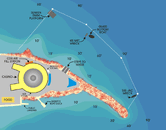Weekend quickie courses have been around for more than 10 years, so the last 5 - 10 years may not be an accurate time frame to consider.
Yes and no. Let's give some perspective/reference though.
The university-based course I took in 1978 ran for a semester (12 weeks) meeting twice a week and then doing the open-water dives at the end over a period of two days. Total course time 60-75 hours. When I started teaching on my own in 1980, the standard format in SoCal was a 4-week course that met twice per week (one night lecture, one night pool - 3 hours each) with two days of ocean diving (one day beach, one day boat) at the end of the course. Total course time 40+ hours. In the 90s in SoCal, the "quickie" courses were two weekends where you were given the book to read beforehand, showed up Friday night for class review, did the poolwork Saturday morning, took the written test Saturday afternoon, beach dive Sunday, boat dive the following weekend. Total course time (not counting the pre-course reading) about 20-25 hours.
It's only in the last 3-5 years (maybe even a little less) that the training agencies have really been pushing the efficacy of eLearning to where now you do it all - including the quizzes and perhaps even the final exam - on-line ahead of time without any instructor input or guidance, bring the paperwork for review Friday night (an instructor looks it over and signs off on it) and you also go through all the poolwork Friday night, beach dives on Saturday and sometimes another beach or boat or Avalon on Sunday and congrats you're now a certified diver. Total course time (not counting the eLearning) 15-20 hours.
Have "quickie" course been around for a while? Yes. Has their content changed? Yes. Has the amount of time you spend with an instructor who can actually discover what you know and don't know diminished? Yes. Does any of this make a difference. Oh my yes!!! (And not for the good IMDO.)
Equipment has changed a lot since the early years as well.
Not really that much. The only difference in gear from my class in 1978 and 2011 is that I wore a horse-collar BC, didn't have an octo (which is not so much a gear change as a philosophy change), and didn't have a dive computer (but had an SPG and depth gauge and learned dive tables). It's really not all THAT much different. And a 1978 embolsim will kill you just as quickly as a 2011 embolism.
Also factor in the easy internet access to information and that people often find boards like this one or mentors who expand their learning way beyond what they learned in their initial course(s).
Which is closing the door after the horse left the barn. What they may or may not learn here (and don't forget there's a LOT of conflicting advice) comes after they're certified to (allegedly) be able to dive on their own.
Also, it is ingrained in the students firstly to continue their dive education with professionals after o/w . . .
And now you've just hit on the biggest flaw in where we are with teaching diving today. While what you say is true, the reality of the numbers from the training agencies are that roughly 80% of the people who get an basic certification
never get anything else. So while the assumption is that (for instance) we'll teach them the basics, then buoyancy, then rescue, then advanced skills and that that together will be on a par with what used to be taught in a single basic class, the reality is that if all they take is basic, then they've only done 1 out of the 4 modules and the argument is that we're certifying divers today with a fraction of the knowledge and experience that we used to consider the minimum.
. . .and secondly that they're really not qualified to do dives with similarly inexperienced buddies . . .
Any instructor who issues a card to someone he feels is not qualified to dive with
anyone else holding a c-card is, IMHO, commiting instructional malpractice. You've GOT to only issue the card when you feel they're comfortable to be out on their own, not hoping that they'll get some more experience and will eventually become good. I still go by the old NAUI standard: Would I let this person dive with one of my loved ones? Yes? Issue the card. No? Do more work with them.
Even though a certified diver is supposed to be proficient and able to plan and execute a dive with a similar buddy in similar conditions to which they were trained, we assume that many divers are neither proficient nor capable and recommend further training and/or mentors.
That, to me, is the saddest part of all of this certification discussion. Why in the world are we producing divers who we wouldn't be proud to point to and say, "That's my student?" How on earth any instructor worth his or her salt can produce a diver who they feel is neither proficient or capable is simply beyond my way of thinking. Those instructors ought to be drummed out of the industry.
End of rant (for now).

- Ken




